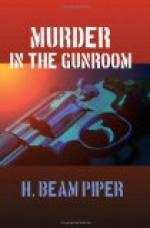“I see one of them’s been emptied out,” he commented. “Want to bet it hasn’t been wiped clean, too?”
“Huh-unh.” Rand smiled slightly. “Even the tiny tots wipe off the cookie-jar, after they’ve raided it,” he said.
A flash-bulb lit the front of the shop briefly. Corporal Kavaalen said something to the others. McKenna picked up the card Rand had found by the edges and looked at it.
“What in hell’s this all about, Jeff?” he asked.
“Rivers made it out for one of his pistols. An English flintlock pocket-pistol; I can show you one almost like it, up front. He’d gotten it and three others, back in 1938, in trade for a Kentucky rifle. The numbers are reference-numbers; the letters are Rivers’s private price-code. Those three at the end are, respectively, what he absolutely had to get for it, what he thought was a reasonable price, and the most he thought the traffic would stand. He sold it in 1942 for his middle price.”
There was another flash by the door, then Kavaalen called out:
“Hey, Mick; we got two of the stiffs, now. All right if we pull out the bayonet for a close-up of his chest?”
“Sure. Better chalkline it, first; you’ll move things jerking that bayonet out.” He turned back to Rand. “You think, then, that maybe some card in that file would have gotten somebody in trouble, and he had to croak Rivers to get it, and then burned the rest of the cards for a cover-up?”
“That’s the way it looks to me,” Rand agreed. “Just because I can’t think of any other possibility, though, doesn’t mean that there aren’t any others.”
“Hey! You think he might have been selling modern arms to criminals, without reporting the sale?” McKenna asked.
“I wouldn’t put it past him,” Rand considered. “There was very little that I would put past that fellow. But I wouldn’t think he’d be stupid enough to carry a record of such sales in his own file, though.”
McKenna rubbed the butt of his .38 reflectively; that seemed to be his substitute for head-scratching, as an aid to cerebration.
“You said you were here yesterday, and bought a pistol,” he began. “All right; I know about that collection of yours. But why were you back here bright and early this morning? You working on Rivers for somebody? If so, give.”
Rand told him what he was working on. “Rivers wants to buy the Fleming collection. That was the reason I saw him yesterday. But the reason I came here, this morning, is that I find that somebody has stolen about two dozen of the best pistols out of the collection since Fleming’s death, and tried to cover up by replacing them with some junk that Lane Fleming wouldn’t have allowed inside his house. For my money, it’s the butler. Now that Fleming’s dead, he’s the only one in the house who knows enough about arms to know what was worth stealing. He has constant access to the gunroom. I caught him in a lie about a book Fleming kept a record of his collection in, and now the book has vanished. And furthermore, and most important, if he’d been on the level, he would have spotted what was going on, long ago, and squawked about it.”




